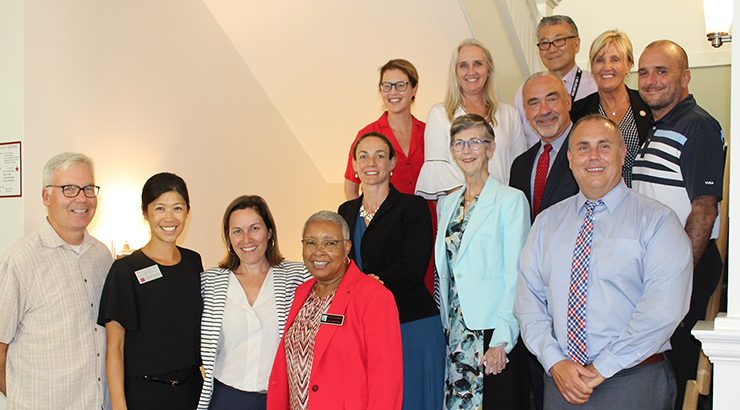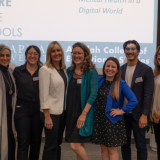
Attallah Convenes New Superintendents and Presidents Advisory Council
September 19, 2019
As part of an ongoing effort to strengthen its programs and serve its partners more effectively, the Attallah College of Educational Studies held its inaugural Superintendents and Presidents Advisory Council (SPAC) meeting this month.
Attallah College Dean Margaret Grogan, Ph.D., explained that this first SPAC meeting was the result of nearly four years of relationship building.
“Deep connections with local educators and stakeholders are essential to the success of our programs and graduates,” said Dean Grogan. “Our goal is to participate in shared dialogue, learn about our partners’ needs, and receive feedback in order to strengthen our degree and credential programs.”
Key Stakeholders
The newly formed advisory council includes representatives from local area school districts, public charter schools, and community colleges:
- Gregory Franklin, Ed.D., Superintendent, Tustin Unified School District
- Gunn Marie Hansen, Ph.D., Superintendent, Orange Unified School District
- John C. Hernandez, Ph.D., President, Santiago Canyon College
- Renée Lancaster, Co-Founder and CEO, NOVA Academy Early College High School
- Susie Lopez-Guerra, Ed.D., Director, Community Relations, Santa Ana Unified School District
- Gabriela Mafi, Ed.D., Superintendent, Garden Grove Unified School District
- Michael B. Matsuda, Superintendent, Anaheim Union High School District
- Andrew Pulver, Ed.D., Superintendent, Los Alamitos Unified School District
- Linda Rose, Ed.D., President, Santa Ana College
- Anthony Saba, Executive Director, Samueli Academy
- Kirsten M. Vital, Superintendent, Capistrano Unified School District
After a brief overview of Attallah College, Associate Professor and Director of Teacher Education Meghan Cosier, Ph.D., shared information about how Chapman’s graduate teaching credential programs are preparing teacher candidates and aligning our programs with California state education trends, which are moving toward a universal credential design that facilitates inclusive education.

Superintendents and Presidents Advisory Council (SPAC) table discussions
Next, Kelly Kennedy, Ph.D., Attallah Associate Professor who leads the School Counseling and School Psychology (CSP) graduate programs, shared information about Chapman’s school-based counseling and psychology programs. Dr. Kennedy particularly emphasized Chapman’s focus on school-based mental health and the addition of the Licensed Professional Clinical Counselor (LPCC) emphasis available for both Chapman’s school counseling and school psychology students.
A key function of the council however is for the SPAC members to give feedback and guidance. Council members are encouraged to provide Attallah College administrators, faculty, and staff with input that will help guide program design and candidate outcome reviews to ensure candidate success and program improvement.
Fruitful Discussion
During the SPAC meeting, members not only shared their goals and challenges with Attallah College, but with one another as well. For example, council members connected on their continued struggle with the teacher shortage in math and science. They also communicated their need for specialized training for teachers and counselors to support students with mental health needs as well as those with severe disabilities.
Dr. Kennedy felt the meeting yielded fruitful discussions for all the participants.
“We have traditionally formed partnerships with one district at a time,” she said. “It was helpful to hear from each district but also listen to them talk to each other. That piece of the meeting felt mutually beneficial. Our partners were able to get ideas from each other and share their common concerns.”
Moving Forward
Attallah College plans to convene the SPAC once a semester or more to share updates on ongoing projects, gather feedback on how Attallah alumni are doing in the workplace, and identify new directions we can take together.
“We will be working closely with our partners to learn how well prepared our teachers, counselors, psychologists, and leaders are when they enter the field,” said Dean Grogan. “Most importantly, we will then use this feedback to support our community partners and improve our degree and credential programs.”

